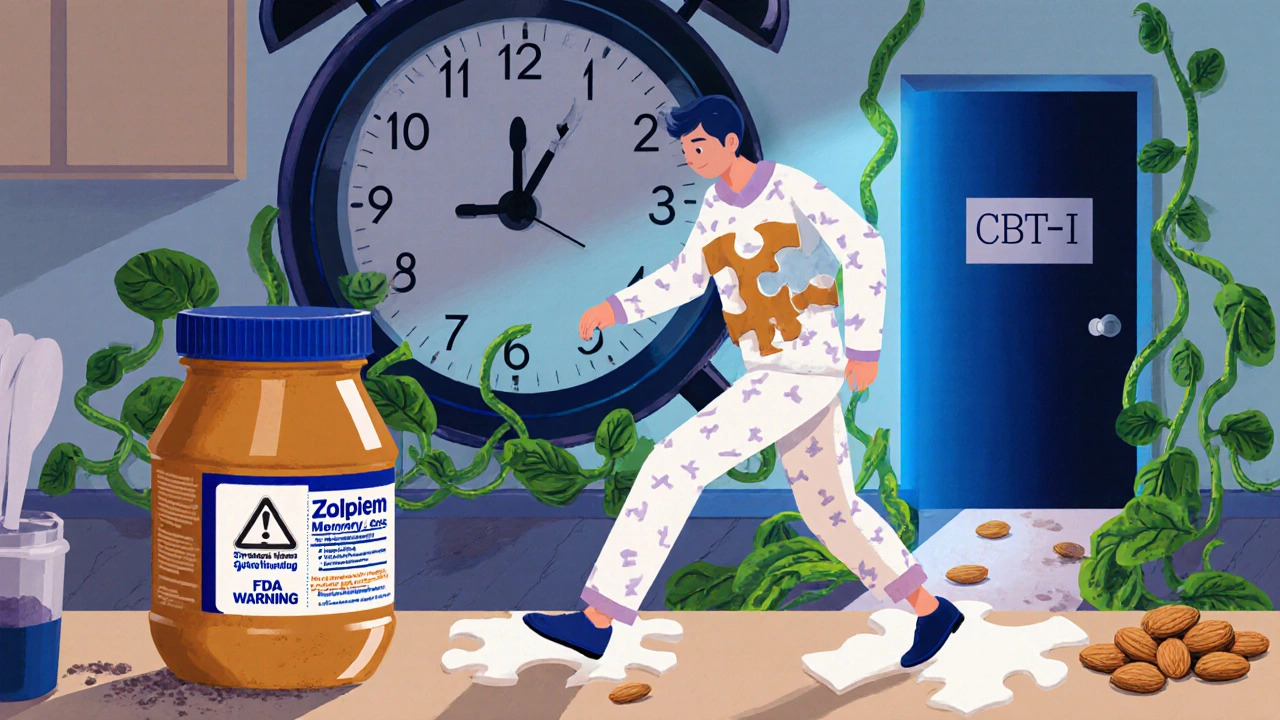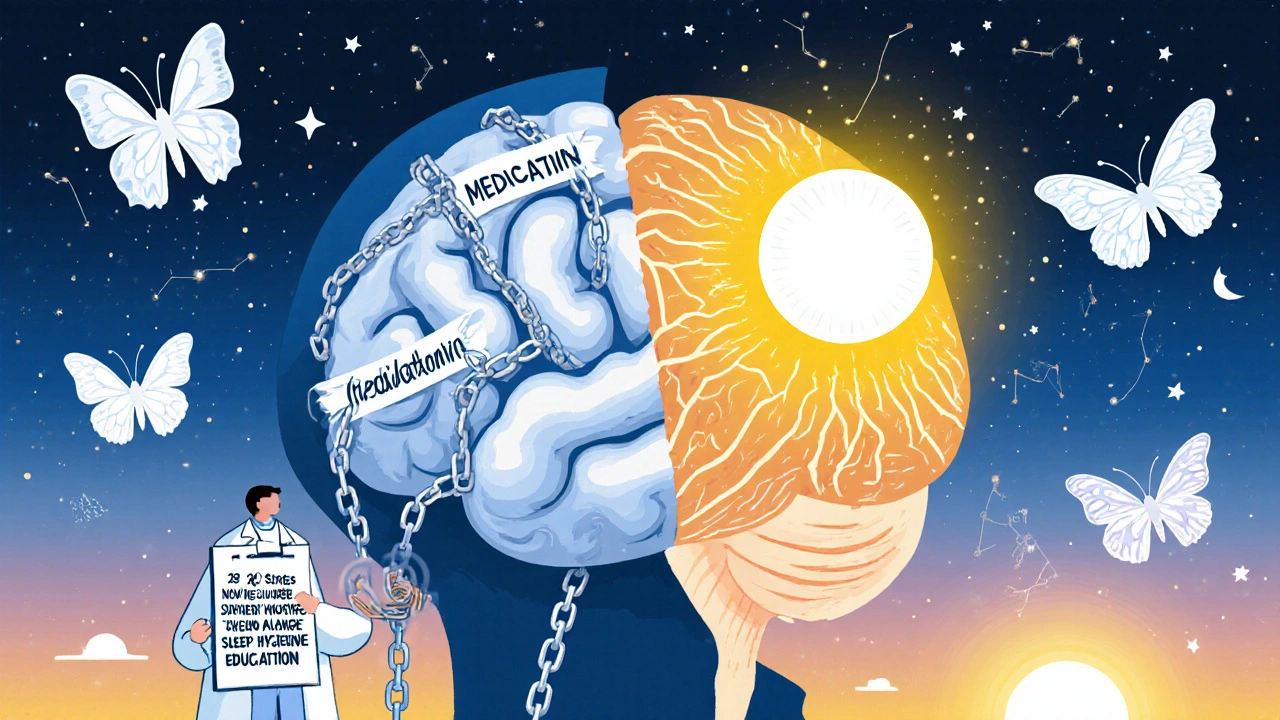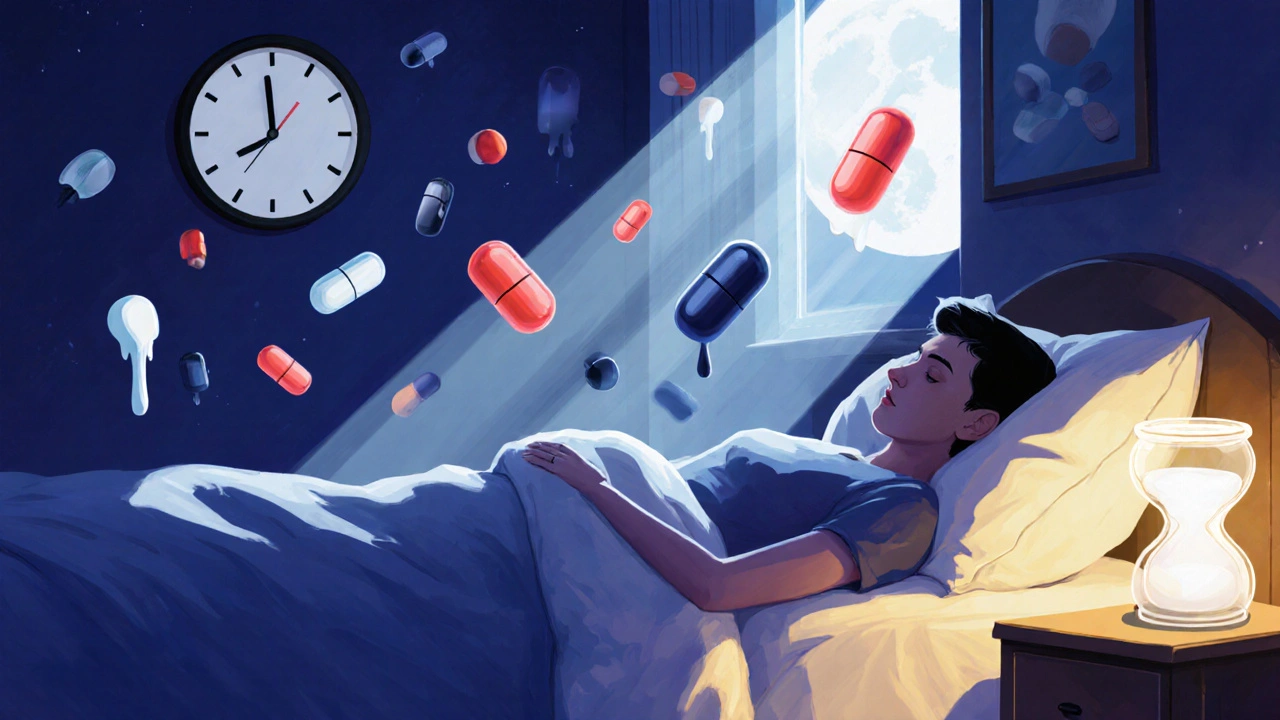Medication-Sleep Interaction Checker
Medication-Sleep Interaction Checker
Enter your medication name to learn if it affects sleep and get personalized sleep hygiene advice.
When your medication is keeping you awake-or making you groggy all day-it’s not just annoying. It’s dangerous. Many people don’t realize that common prescriptions for high blood pressure, depression, or even insomnia itself can wreck your sleep cycle. And when you’re already tired from poor rest, adding more pills to fix it often makes things worse. The truth is, sleep hygiene isn’t just for people who drink coffee too late. It’s your first and most powerful defense when medications are stealing your rest.
Why Your Medication Is Sabotaging Your Sleep
Not all drugs affect sleep the same way. Some wake you up. Others leave you dazed the next morning. Fluoxetine (Prozac), a common antidepressant, can be so stimulating that falling asleep feels impossible. Meanwhile, paroxetine (Paxil), from the same drug family, often makes people feel sleepy. That’s why you can’t assume all antidepressants act alike. Beta blockers like metoprolol and atenolol, used for heart conditions, cut your body’s natural melatonin by nearly 40%. That’s enough to throw off your internal clock, making it harder to fall asleep and stay asleep. Even sleep meds themselves are part of the problem. A 2015 study of over 1,200 people taking drugs like zolpidem (Ambien) and temazepam found that 68% felt groggy the next day, more than half struggled to focus, and 42% had memory lapses. These aren’t rare side effects-they’re the norm. And it’s not just drowsiness. Some people report sleepwalking, eating in their sleep, or even driving while half-asleep. The FDA added a black box warning to these drugs in 2019 after reviewing 66 serious cases. That’s the strongest safety alert they can issue.The Hidden Cost of Long-Term Sleep Meds
If you’ve been taking sleep medication for months or years, you’re at higher risk for something far worse than grogginess. A major study tracking nearly 90,000 people over eight years found that long-term users of sleep drugs had a 138% higher chance of developing dementia. Benzodiazepines and Z-drugs like Lunesta and Sonata carry a 1.83 times greater risk of dementia, according to the American College of Physicians. These aren’t theoretical risks. These are real, documented outcomes. The problem isn’t just the drugs themselves. It’s how they’re used. Many people take zolpidem at 10 p.m. but don’t get to bed until 11:30 p.m. That delay creates a dangerous mismatch. The drug peaks in your system too late, so instead of helping you sleep, it hangs around into the morning. The FDA says taking zolpidem only when you can get 7-8 hours of uninterrupted sleep cuts next-day side effects by 32%. That’s not a suggestion-it’s a safety rule.What Sleep Hygiene Actually Means When You’re on Medication
Sleep hygiene isn’t about candles and lavender. It’s science-backed behavior changes that fix the root causes of disrupted sleep. When medications are involved, you need to be even more precise.- Wake up at the same time every day-even on weekends. Your body needs a fixed anchor. If you’re on beta blockers that suppress melatonin, your internal clock is already off. A consistent wake time resets it. A 2022 JAMA study showed that people who stuck to a 30-minute wake window for 21 days improved their sleep efficiency by over 58%.
- Get bright light within 30 minutes of waking. A 10,000-lux light box for 30 minutes right after getting up fights the melatonin suppression caused by blood pressure meds. Natural sunlight works too-if you can get outside.
- No screens after 8 p.m. Blue light blocks melatonin. If your meds are already lowering it, you can’t afford to dim it further. Put your phone in another room. Use a traditional alarm clock.
- Exercise-but not too late. Working out boosts sleep quality, but if you’re on stimulant meds like SSRIs, evening exercise can keep you wired. Do it at least four hours before bed.
- Time your meds right. If you take a stimulant like fluoxetine, take it in the morning. If you take a sedating one like trazodone, take it at least an hour before bed. Never mix sleep meds with alcohol. Ever.

Dietary Tweaks That Actually Help
What you eat can make your medication’s side effects worse-or better. Aged cheeses, cured meats, and soy sauce are high in tyramine. That’s fine if you’re not on blood pressure meds. But if you are, tyramine can spike your blood pressure and keep you awake. Avoid them after 6 p.m. On the flip side, magnesium helps. A 2020 study in Nutrients found that people who took 500 mg of magnesium daily reduced their insomnia severity by 34.7 points on a standard scale. You don’t need a pill. Just eat more almonds, spinach, black beans, and pumpkin seeds. One handful of almonds gives you about 80 mg. Add a spinach salad at dinner. Small changes add up.When to Talk to Your Doctor-And What to Ask
Don’t just live with bad sleep. Schedule a medication review. Bring a list of everything you take, including over-the-counter pills and supplements. Ask these three questions:- Which of my medications are known to disrupt sleep?
- Is there a non-sedating alternative for my condition?
- Can we try reducing or stopping the sleep medication while I build better sleep habits?
Real People, Real Results
On Reddit’s r/Insomnia forum, 78% of 1,243 users said they felt severely groggy after taking zolpidem. One user wrote: “I woke up with my kitchen counters covered in peanut butter. I didn’t remember eating it.” That’s not a joke-it’s a documented side effect called complex sleep-related eating disorder. But change is possible. In the Sleepio CBT-I program, 71% of users reported less next-day impairment within six weeks. The key? Consistent wake times and light exposure. People who followed those two rules saw the biggest improvements.
The Bigger Shift: Why Sleep Hygiene Is Now the Standard
The tide is turning. Prescription sleep med use has dropped 22.4% since 2019. Meanwhile, digital CBT-I apps like Sleepio and Somryst have grown 347% since 2020. Twenty-eight U.S. states now require doctors to document sleep hygiene education before prescribing long-term sleep meds. The European Medicines Agency limits benzodiazepines to four weeks max. Apple’s Health app now tracks medication-specific sleep disruption risks using FDA data. If you’re on metoprolol, it might suggest light therapy in the morning. If you’re on fluoxetine, it might nudge you to avoid afternoon workouts. This isn’t sci-fi-it’s here. The NIH just funded $14.7 million for a national initiative to help older adults, who are 3.2 times more likely to suffer severe side effects from sleep meds. The goal? Get them off pills and into better sleep habits.Start Here: Your 7-Day Sleep Hygiene Plan
You don’t need to overhaul your life. Just do these seven things for one week:- Set your alarm for the same time every day. No exceptions.
- Get 10 minutes of sunlight or use a 10,000-lux light box within 30 minutes of waking.
- Stop using phones, tablets, and TVs after 8 p.m.
- Take your stimulant meds before noon. Take sedating meds at least one hour before bed.
- Have a handful of almonds or a spinach salad for dinner.
- Don’t drink caffeine after 2 p.m.
- Write down one thing you’re grateful for before bed. It calms your nervous system.
Medications aren’t the enemy. But they’re not the solution either. The real fix is in your daily habits. And you don’t need a prescription to start.
Can sleep hygiene replace my sleep medication entirely?
Yes, for many people. Cognitive behavioral therapy for insomnia (CBT-I) is more effective than sleep meds long-term and has no side effects. The American College of Physicians recommends it as the first-line treatment for chronic insomnia. You don’t have to quit your medication cold turkey-work with your doctor to taper off while building better sleep habits. Many people reduce or eliminate their meds within 6-12 weeks of starting CBT-I.
Why do beta blockers make it hard to sleep?
Beta blockers like metoprolol and atenolol block the body’s natural production of melatonin, the hormone that tells your brain it’s time to sleep. Studies show they can reduce melatonin levels by up to 37%. That throws off your circadian rhythm, making it harder to fall asleep and stay asleep-even if you feel tired. The fix? Morning light exposure and strict sleep schedules to reset your internal clock.
Is it safe to take melatonin supplements with my meds?
It depends. Melatonin can interact with blood pressure meds, diabetes drugs, and immunosuppressants. It may also make sedating meds like trazodone or zolpidem too strong, increasing drowsiness and fall risk. Never start melatonin without talking to your doctor. Instead of supplements, focus on natural ways to boost melatonin: darkness after 8 p.m., consistent wake times, and morning light.
What should I do if I wake up in the middle of the night and can’t fall back asleep?
Get out of bed. Don’t lie there stressing. Go to another room, turn on a dim light, and do something quiet-read a book, listen to soft music, or stretch gently. Stay out of bed until you feel sleepy again. This breaks the cycle of associating your bed with wakefulness. It’s a core part of CBT-I and works even when meds are involved.
Can I still drink alcohol if I’m on sleep medication?
No. Alcohol makes sleep meds more potent and increases the risk of dangerous side effects like sleepwalking, memory loss, and impaired driving. It also disrupts deep sleep, leaving you more tired the next day. Even one drink can double your risk of next-day impairment. Skip it entirely while on sleep meds.
How long does it take for sleep hygiene to work when on medication?
Most people notice small improvements within 7-10 days-better sleep onset, less nighttime waking. Significant changes, like reduced next-day grogginess, usually show up in 3-6 weeks. The key is consistency. Missing a day or two won’t ruin progress, but giving up too soon will. Stick with it for at least 21 days to retrain your body’s rhythm.
Are there any apps that help track medication-related sleep issues?
Yes. Apple’s iOS 17 Health app now includes a medication-specific sleep disruption risk score based on FDA adverse event data. It tells you if your meds are likely to interfere with sleep and suggests personalized hygiene tips. Other apps like Sleepio and Somryst offer guided CBT-I programs designed for people on medications. Many are covered by insurance now.


Comments (12)
Christopher Robinson
Just tried the 10,000-lux light box after waking up-holy crap, it actually works. I’ve been on metoprolol for years and felt like a zombie until this. No more 10 a.m. naps. 🌞
Angela Gutschwager
Almonds at dinner? Cute. I’m just gonna keep taking Ambien. At least I sleep.
Andy Feltus
Medications aren’t the enemy-but our belief that we need them to fix biology is. We outsource our sleep to pills like it’s a software bug you can patch with an update. Meanwhile, your circadian rhythm is screaming into a void. You don’t need a prescription to reset your body. You just need to stop pretending you’re a machine.
Kara Binning
My doctor said CBT-I is ‘too time-consuming’ and just prescribed me more zolpidem. Like, wow. Thanks for the life advice, Dr. Profit. 🤡
Timothy Reed
This is one of the most clinically grounded pieces on sleep hygiene I’ve read in years. The data on melatonin suppression from beta-blockers is especially critical-most clinicians don’t connect the dots. I’ve started recommending the morning light protocol to all my patients on metoprolol, and the improvement in sleep efficiency has been remarkable. Consistency is everything.
harenee hanapi
Oh please. You think eating almonds fixes everything? My husband’s on Prozac and still wakes up at 3 a.m. screaming about aliens. You’re just sugar-coating the pharmaceutical-industrial complex. I’ve been on 7 different meds since 2018 and nothing works. Why do you think I’m still awake at 4 a.m. typing this? 😭
Dion Hetemi
Let’s be real-this whole post is just a glorified ad for Sleepio. The 138% dementia risk? Cited from one observational study with confounding variables. The ‘FDA black box warning’? That’s for sleepwalking, not dementia. And the ‘71% improvement’? That’s from a company-funded trial. Don’t fall for the wellness-industrial complex. Real medicine needs real data, not Reddit anecdotes.
river weiss
One thing no one mentions: the role of cortisol rhythm. If you’re on SSRIs, your HPA axis is already dysregulated. Morning light exposure doesn’t just reset melatonin-it normalizes cortisol decline across the day. That’s why the 30-minute window matters. Also, magnesium glycinate > oxide. The latter doesn’t cross the blood-brain barrier. And yes, it’s been peer-reviewed. Multiple times.
Nick Lesieur
so u say no screens after 8 but u use a phone to write this?? lmao
Zac Gray
That’s a fair point. But I’m not using my phone to scroll-I’m using it to set a timer for my light box and to log my sleep in a simple app. The point isn’t to be perfect. It’s to be intentional. If you’re using screens to distract yourself from the fact that you’re scared to be alone with your thoughts at night… that’s the real problem.
Ellen Calnan
I used to think sleep hygiene was for people who drank too much coffee. Then I started taking trazodone and realized: I wasn’t sleeping-I was just sedated. I did the 7-day plan. No magic. Just consistency. Woke up at 6:30 every day. Got sunlight. No phone after 8. Ate spinach. And now? I don’t need the pill anymore. Not because I’m strong. Because my body finally remembered how to rest. 🌿
James Ó Nuanáin
As a British citizen who has witnessed the American obsession with self-optimization, I must say: this is the most rational, evidence-based, and un-hysterical piece on sleep I have encountered in years. The European Medicines Agency’s four-week limit on benzodiazepines is not merely prudent-it is a moral imperative. The fact that your nation still permits long-term prescribing of these neurotoxins without mandatory CBT-I referral is a scandal. I applaud your diligence. Keep fighting the good fight.